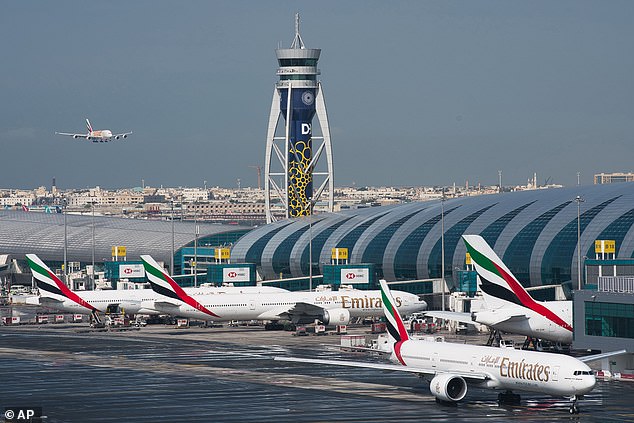Emirates Airlines has banned pagers and walkie-talkies on its planes following last month’s attacks on Lebanese terror group Hezbollah involving communication devices that exploded.
‘All passengers travelling to, from, or via Dubai are prohibited from transporting pagers and walkie-talkies in checked or cabin baggage,’ the airline said in a statement on its website on Friday.
It added that any prohibited items found will be confiscated by Dubai Police as part of heightened security measures.
In the deadly September attacks, thousands of booby-trapped Hezbollah pagers and hundreds of radios exploded – attacks that were widely blamed on Israel but which it has not claimed.
It comes as Emirates announced that flights to Iraq and Iran will remain suspended until Tuesday, while services to Jordan will resume tomorrow.

Emirates Airlines has banned pagers and walkie-talkies on its planes following last month’s attacks on Lebanese terror group Hezbollah involving communication devices that exploded (file image of emirates planes)

Pagers used by Hezbollah members for vital communications exploded on September 17, injuring hundreds

The remnants of what is believed to be a pager carried by a Lebanese militant that detonated on September 17
Flights to Lebanon will remain suspended until October 15 due to escalating Israeli attacks against Iran-backed Hezbollah, including strikes near Beirut’s airport.
Several other airlines have also suspended flights to Beirut and other regional airports amid heightened tensions.
Nine people, including two young girls, were killed and thousands left injured across Lebanon on September 17 after the pagers used by Hezbollah fighters exploded.
The wave of sudden and unexpected detonations, which began around 3.45pm local time (1345 GMT) and lasted roughly an hour, maimed over 2,750 Hezbollah members and civilians, giving way to widespread panic and chaotic scenes across Beirut’s southern suburbs, the Bekaa Valley and southern Lebanon.
Victims were seen sporting horrific wounds as they lay on the ground surrounded by terrified bystanders in images shared to social media and broadcast by Lebanese and Israeli networks.
Yet more harrowing clips taken inside Lebanese hospitals showed how some unfortunate victims sustained massive head injuries, gaping wounds in their legs and abdomen, or had their hands blown off by the powerful explosions.
At least two Hezbollah fighters – one of whom is the son of Lebanese parliament member Ali Ammar – were confirmed dead by multiple security sources and a family member, according to AFP.
An eight-year-old girl from the the Bekaa Valley, and a 10-year-old daughter of a Hezbollah member, were also killed in the explosions.


The incident saw scores of Hezbollah members severely injured throughout southern Lebanon and in its capital Beirut

This is the moment a pager exploded in a supermarket, blowing its owner (bottom left) to the ground and causing significant injuries

Police officers inspect a car inside of which a hand-held pager exploded, Beirut, Lebanon, Tuesday, Sept. 17, 2024

Lebanese soldiers and Hezbollah members gather outside a hospital where injured people were being transported, following an incident involving Hezbollah members’ wireless devices in Dahieh, Beirut, south Lebanon, 17 September 2024

A spokesperson for the group has since said that Hassan Nasrallah, the group’s chief, was not harmed in the blasts, though Iran’s ambassador to Lebanon, Mojtaba Amani, sustained injuries.
Hezbollah says that Israel is ‘fully responsible’ for the simultaneous explosion, warning that the nation would be punished.
The brutally effective detonations appear to have been triggered by a small amount of high explosive charge inserted into the pagers prior to their delivery to Hezbollah – and then activated remotely.
‘We hold the Israeli enemy fully responsible for this criminal aggression,’ Hezbollah said in a statement, adding that Israel ‘will certainly receive its just punishment’.
The Lebanese government, meanwhile, condemned the pager explosions as ‘criminal Israeli aggression.’
Prime Minister Najib Mikati said in a cabinet meeting, following the incidents, that the attack was ‘criminal Israeli aggression, which constitutes a serious violation of Lebanese sovereignty and a crime by all standards.’
A Lebanese security source told CNN that the pagers that exploded had been purchased in recent months, though did not provide any information as to their exact model.
Very small explosive devices may have been built into the pagers prior to their delivery to Hezbollah, and then all remotely triggered simultaneously, possibly with a radio signal.
By the time of the attack, ‘the battery was probably half-explosive and half-actual battery,’ said Carlos Perez, director of security intelligence at TrustedSec.
A former British Army bomb disposal officer explained that an explosive device has five main components: a container, a battery, a triggering device, a detonator and an explosive charge.
‘A pager has three of those already,’ explained the ex-officer, who spoke on condition of anonymity because he now works as a consultant with clients on the Middle East. ‘You would only need to add the detonator and the charge.’

